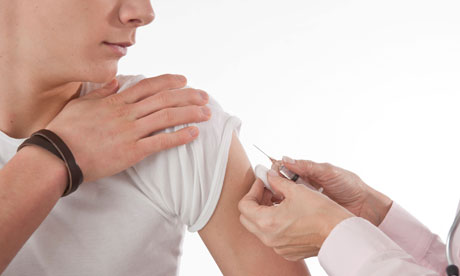
Human papilloma virus (HPV) is best known for causing most cases of cervical cancer. But Pavol Krascenic became infected as a result of having sex with his then boyfriend. Unfortunately for Krascenic, as a result of contracting HPV, he was diagnosed with a precursor to anal cancer, which is hard to treat. Despite four operations to curb its spread, he is in terrible pain much of the time. "The steroid cream I got from a London hospital made no difference and the painkillers I take every day are so strong they make me feel like I'm on another planet, like I'm drunk, and even then I still have the pain and often have to lie down to relieve it," says the 31-year-old who was a chef in London until 2009 when his condition left him unable to work and seriously depressed.
The pre-cancerous growths in the anus also weaken a sufferer's immune system and, for gay men, leaves them more likely to get infected with HIV. In 2008, Krascenic was diagnosed with that too, which made the growths more painful. "A lot of gay men don't know about HPV or think that it only affects girls, but HPV is dangerous," he says. "Gay men are often shocked and surprised when they find out it's something that can affect them too."
Krascenic is supporting a new campaign by doctors, sexual health experts, politicians and charities, including the Terrence Higgins Trust, for gay men to be offered a vaccination against HPV in the same way that 12- and 13-year-old girls already are in order to protect them against cervical cancer – research suggests the vaccination is effective for those under 26. "If I'd known there was a vaccination against HPV I would have paid for it myself, given what I know about the virus," says Krascenic.
The possibility of gay men becoming eligible for the HPV vaccination may move closer on Wednesday when the Joint Committee on Vaccination and Immunisation (JCVI) – experts who advise the government on the use of vaccination to tackle any medical condition – discuss the issue. If they approve it, this would prevent gay men worried about HPV having to pay up to £450 to be immunised privately, which at the moment is their only option. Of the 77,917 gay men who visited a sexual health clinic in 2010, 16,962 of those under 26 would have been eligible to have the jab if it were available, sexual health experts estimate.
Lord Fowler, widely admired for his work as the Conservative government's health secretary when Aids emerged in the 1980s, has written to Anne Milton, the public health minister, calling gay men's exclusion from HPV jabs "clearly unequal and unfair".
He wrote: "There is a clear inequity in the HPV vaccination programme offered to all 12- and 13-year-old girls. As the four strains of HPV vaccinated against are sexually transmitted, heterosexual males will eventually receive indirect protection against the related cancers and genital warts by a herd immunity effect. Men who have sex with men, meanwhile, receive no such protection, despite increasing rates of anal cancer in this group."
The number of men in Britain diagnosed with anal cancer rose from 100 a year in 1975-77 to around 370 a year in 2007-2009. The number of deaths went from 20 to 120 a year over the same period, according to Cancer Research UK. HPV also causes penile, oral and throat cancers in gay men, with the virus again transmitted sexually. Extending HPV jabs to gay men would be cost-effective and save the NHS money, it is argued.
Peter Greenhouse, a gynaecologist specialising in sexual health and spokesman for the British Association of Sexual Health and HIV (BASHH), says the UK should learn from Australia where there has been a huge drop in genital warts in both young women and young men since it began giving girls the HPV jab in 2007. Young gay men, though, have not seen the same benefit. "That has prompted some sexual health clinics to start offering them the injections so that their future sexual behaviour does not harm their health, in the same way that gay men in both Australia and the UK are already immunised against Hepatitis B," he says.
The Australian government's pharmaceutical benefits advisory committee last year advised ministers that boys as well as girls aged 12 and 13 should receive the vaccine, though the federal health minister has yet to concur. Similarly, in the US the federal advisory committee on immunisation practices (ACIP) has recommended that the jab be offered to 11- and 12-year-old boys and males aged 13 to 21 who were not vaccinated previously, as well as men aged 22 to 26 who are gay, bisexual or who have a compromised immune system. The US government has yet to respond.
In the UK, Krascenic is in no doubt about what the JCVI's decision should be: "It's unfair that the vaccine is only for girls and that gay men can't get it. This is a public health problem, so the vaccination should be free on the NHS." He adds: "I'm costing the government much more now, in healthcare costs and welfare benefits, because I'm ill and out of work. But if the vaccine had been available, I might have avoided this."

